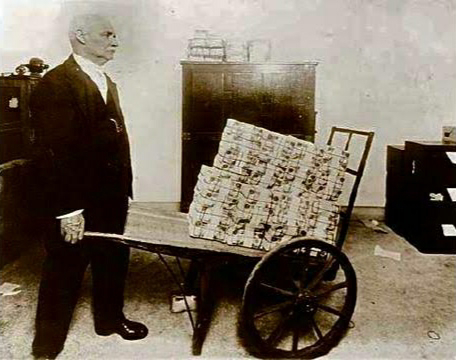Effects of Nazism and the Rise of Hitler
In the spring of 1945, a little eleven-year-old German boy called Helmuth was lying in bed when he overheard his parents discussing something in serious tones. His father, a prominent physician, deliberated with his wife whether the time had come to kill the entire family, or if he should commit suicide alone. His father spoke about his fear of revenge, saying, Now the Allies will do to us what we did to the crippled and Jews. The next day, he took Helmuth to the woods, where they spent their last happy time together, singing old childrens songs. Later, Helmuths father shot himself in his office. Helmuth remembers that he saw his fathers bloody uniform being burnt in the family fireplace. So traumatised was he by what he had overheard and what had happened, that he reacted by refusing to eat at home for the following nine years! He was afraid that his mother might poison him.
Although Helmuth may not have realised all that it meant, his father had been a Nazi and a supporter of Adolf Hitler. Many of you will know something about the Nazis and Hitler. You probably know of Hitlers determination to make Germany into a mighty power and his ambition of conquering all of Europe. You may have heard that he killed Jews. But Nazism was not one or two isolated acts. It was a system, a structure of ideas about the world and politics. Let us try and understand what Nazism was all about. Let us see why Helmuths father killed himself and what the basis of his fear was.
In May 1945, Germany surrendered to the Allies. Anticipating what was coming, Hitler, his propaganda minister Goebbels and his entire family committed suicide collectively in his Berlin bunker in April. At the end of the war, an International Military Tribunal at Nuremberg was set up to prosecute Nazi war criminals for Crimes against Peace, for War Crimes and Crimes Against Humanity. Germanys conduct during the war, especially those actions which came to be called Crimes Against Humanity, raised serious moral and ethical questions and invited worldwide condemnation.
Auschwitz concentration camp
What were these acts?
Under the shadow of the Second World War, Germany had waged a genocidal war, which resulted in the mass murder of selected groups of innocent civilians of Europe. The number of people killed included 6 million Jews, 200,000 Gypsies, 1 million Polish civilians, 70,000 Germans who were considered mentally and physically disabled, besides innumerable political opponents. Nazis devised an unprecedented means of killing people, that is, by gassing them in various killing centres like Auschwitz. The Nuremberg Tribunal sentenced only eleven leading Nazis to death. Many others were imprisoned for life. The retribution did come, yet the punishment of the Nazis was far short of the brutality and extent of their crimes. The Allies did not want to be as harsh on defeated Germany as they had been after the First World War.
Everyone came to feel that the rise of Nazi Germany could be partly traced back to the German experience at the end of the First World War like Treaty of Versailles, Economic crisis, The Great Depression and Unemployment.








Comments